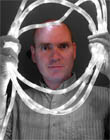|
|
This topic comprises 3 pages: 1 2 3
|
|
Author
|
Topic: Help with my movie...
|
|
|
|
|
|
|
|
|
|
|
|
|
|
|
Greg Anderson
Jedi Master Film Handler

Posts: 766
From: Ogden Valley, Utah
Registered: Nov 1999
|
 posted 08-07-2011 01:44 PM
posted 08-07-2011 01:44 PM





As I read the idea for your documentary I interpret it to mean, “I'm exploring how the world of cinema is changing and I'm looking for people who will whine about it either openly or secretly.” I fail to see why this is a compelling story for anyone who doesn't already work in the industry and who hasn't already seen the writing on the wall for years. If you hope to turn back the tide then you'll have to convince the general public that this is something worth thinking about. And that's not going to happen. And if you merely want to document this moment without hoping to change anything then... yawn... I still don't see the appeal.
As projectionists, we are like blacksmiths in a world where people don't use horses to commute to work anymore. We can complain that our skills and craftsmanship will be lost to history but, on the other hand, the market doesn't need us the way it used to. And there's no turning back the clock.
You'll find people who'll say that movies don't look as good since theatres stopped using carbon arc lamps. It doesn't matter. We're never going back to that. Digital sound isn't as good as analog 6-track magnetic sound, they say. But it doesn't matter because we're never going back to that.
If you want to explore the switch from film to digital you're just taking a snapshot of what's happening right now. But “bad things” have been happening to the business for over 30 years. In the 1970s, the switch from changeover systems to platter systems was a blow to the projectionist trade. In the 1980s, the trend towards multiplexes hurt the smaller venues. The early 1990s brought us a lot of multiplexes with 8 or more screens, which hurt the 2-screen and 4-screen businesses. Then the 8-plexes were hurt in the late-1990s because all of the newer 8-plexes and 12-plexes had stadium seating. And never mind how Hollywood has pushed the emphasis towards opening weekend grosses (and nobody cares to wait all summer for a movie to make its money).
So now the big, bad bully on the playground is digital. Meanwhile, the customer is getting what they want. Let's face it, there hasn't been a designated projectionist keeping a constant eye on each screen to ensure a flawless performance since... before most of us were born. And, with that kind of business model, a digital system does seem to offer a more predictable, trouble-free experience for the customer. They also don't have to wait weeks before a movie has a non-sold-out show on a Saturday night. And if they miss the movie they can watch it on their iPhone at the end of the summer anyway. Most people don't have a state-of-the-art sound system or monitor at home but DVDs with Dolby Digital are still so much better than the VHS we grew up with. So, as much as some around here would deny it, the bar has generally been raised anyway.
In summary: If the customers aren't upset then where's your story?
| IP: Logged
|
|
|
|
|
|
|
|
|
|
|
|
|
|
|
|
|
|
All times are Central (GMT -6:00)
|
This topic comprises 3 pages: 1 2 3
|
Powered by Infopop Corporation
UBB.classicTM
6.3.1.2
The Film-Tech Forums are designed for various members related to the cinema industry to express their opinions, viewpoints and testimonials on various products, services and events based upon speculation, personal knowledge and factual information through use, therefore all views represented here allow no liability upon the publishers of this web site and the owners of said views assume no liability for any ill will resulting from these postings. The posts made here are for educational as well as entertainment purposes and as such anyone viewing this portion of the website must accept these views as statements of the author of that opinion
and agrees to release the authors from any and all liability.
|

 Home
Home
 Products
Products
 Store
Store
 Forum
Forum
 Warehouse
Warehouse
 Contact Us
Contact Us




 Printer-friendly view of this topic
Printer-friendly view of this topic















